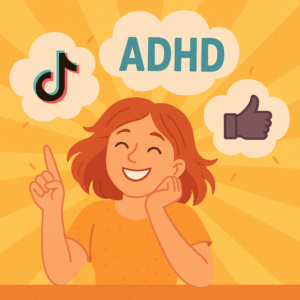Why Do So Many People Self-Diagnose with ADHD Today?
In recent years, it feels like ADHD has taken over social media.
“I just found out I have ADHD at 30!”
“If you do this, you probably have ADHD.”
“This explains everything!”
While this growing conversation has helped reduce stigma, it has also led to a wave of self-diagnoses—some accurate, many confused, and a few misguided.
So, why is this happening?
📱 The Social Media Effect
Platforms like Instagram, TikTok, and YouTube are flooded with relatable content on ADHD—checklists, reels, memes.
-
“Do you daydream constantly?”
-
“Can’t finish tasks?”
-
“Feel mentally ‘cluttered’ all the time?”
These bite-sized symptoms resonate with millions. But ADHD isn’t just a few quirky traits—it’s a complex neurodevelopmental condition with clear diagnostic criteria.
🧠 Why ADHD Feels So Relatable
ADHD symptoms overlap with:
-
Burnout
-
Anxiety and depression
-
Poor sleep or stress
-
Digital distraction and modern multitasking
-
Executive dysfunction from other causes
In our overstimulated, hyperproductive world, many people are struggling with attention—but not all of them have ADHD.
🤔 What Drives Self-Diagnosis?
-
Validation of Long-standing Struggles
Adults who’ve faced a lifetime of messiness, forgetfulness, or shame find comfort in ADHD explanations. -
Frustration with Healthcare Access
Long waiting lists, dismissal by professionals, and high costs push people to seek answers online. -
Neurodiversity Movement
A growing belief that brain differences should be understood—not pathologized—has led people to explore labels like ADHD for self-awareness. -
The TikTok Loop
Algorithms feed users more ADHD content if they engage once—creating an echo chamber of “maybe I have this too.”
🧪 The Risk of Self-Diagnosis
-
Mislabeling leads to missed diagnoses (e.g., trauma, anxiety)
-
Inappropriate use of medication or supplements
-
Reinforcement of false beliefs about oneself
-
Anxiety and over-identification with the disorder
Self-awareness is powerful—but self-diagnosis isn’t a substitute for professional evaluation.
🧭 What To Do If You Suspect ADHD
-
Keep a symptom journal
-
Talk to a mental health professional
-
Ask about formal assessments—including QEEG or cognitive screening
-
Understand your unique profile: Not everyone with ADHD is hyper or disorganized
Final Thoughts
The ADHD “trend” is really a reflection of something deeper: a generation becoming aware of how their brain works—and wanting answers.
That’s something to applaud.
But label responsibly. Diagnosis is not about identity—it’s about improving your quality of life through understanding, support, and evidence-based care.
ADHD Assessments at Mind & Memory Lab, Chennai
We offer a balanced, evidence-informed approach:
-
QEEG Brain Mapping
-
Adult & Teen ADHD Screening
-
Cognitive Therapy & Support
-
Online and Offline Consultations
Dr. Srinivas Rajkumar T
Consultant Psychiatrist
Apollo Clinics Velachery & Tambaram
Website: www.srinivasaiims.com
📞 Appointments: 85951 55808